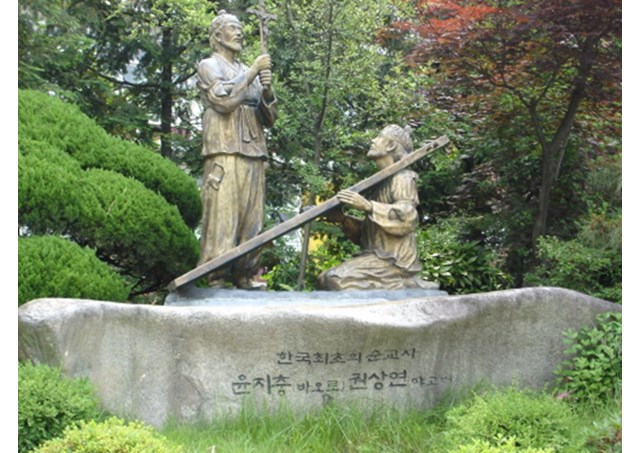
Pope Francis' pilgrimage to Korea for youth, martyrs and peace

A long awaited Apostolic visit of Pope Francis to South Korea is taking shape with the Vatican Press Office on Wednesday releasing the Programme for his Journey. The visit focuses on three main themes: youth, martyrs and peace. The motto of the journey is “Rise Korea, clothe yourself in light, the Lord’s glory shines upon you”.
The Holy Father is scheduled to meet with young people gathered in Daejeon for Asian Youth Day. He will also celebrate the beatification of Paul Yun Ji-chung and his 123 companions, victims of the persecution under Korea's Joseon kingdom. On the final day he will be celebrating a Mass for Peace and Reconciliation at the Myeongdong Cathedral in Seoul.
Pope Francis will leave the Italian shores on Wednesday, 13 August 2014, at 4 pm, and he is expected to arrive at Seoul's military airport the next day, at around 10:30 am (considering the 9-hour difference between Rome and Seoul).
Apart from his meetings with Authorities and Church and civic dignitaries, he will meet the faithful at mass on Friday, 15August, in Daejeon on the occasion of the Solemnity of the Assumption of our Lady at the Stadium built for the World Cup in Korea. Moreover he will be accompanying the young Asians at Lunch at the Major Seminary in Daejeon. In the afternoon, he will meet the Asian youth at the Solmoe Shrine, also in the Diocese of Daejeon.
Solmoe, which means 'a mountain with dense pine forests,' is a small village situated in Ugang-myeon of Dangjin with dense forests of old pine trees. This is the birthplace of Korea's first priest and Saint Andrew Kim Taegon. Countless pilgrims visit this area for a chance to see his house and the monument that was erected in commemoration of their beloved saint.
On Saturday, 16 August, a visit is scheduled in the morning to the shrine of the martyrs in Seosomun, Seoul, built on the site where 44 out of the 103 Korean martyrs, many Servants of God and other Catholic martyrs in the earlier Church in Korea sacrificed their lives. It is the largest shrine dedicated to the victims of 18th century religious persecution, one of the sites most revered by the entire Korean Church.
At the end of the 18th century Korea was a country ruled by the Joseon Dynasty. It was a society based on Confucianism with its hierarchical, class relationships. Wider Joseon society followed the Neo-Confucianism, so Catholicism was regarded as a heterodoxy that threatened the existing order and was consequently rejected. The Joseon government branded Catholicism as the science of aggressive foreign forces. Catholics were attacked and persecuted by the Joseon government until the signature of the Korean-French Treaty in 1886. Anti-Catholicism reached a peak in 1866 when about 8,000 Catholics, including nine foreign priests, laymen, and faith leaders, were martyred.
In all, more than 10,000 martyrs died in persecutions which extended over more than one hundred years. Of all these martyrs, seventy-nine were beatified in 1925. They had died in the persecutions of 1839 (Ki-hae persecution), 1846 (Pyong-o persecution) and 1866 (Pyong-in persecution). In addition, twenty-four martyrs were beatified in 1968. All together, 103 martyrs were canonized by Pope John Paul II on May 6, 1984. In a break with tradition, the ceremony did not take place in Rome, but in Seoul.
It is this visit of Pope Francis which will further popularize another saga of martyrs at 10 am, on August 16 at the beatification Mass for Paul Yun Ji-Chung and 123 companions which will be celebrated at the square in front of the Gwanghwamun Gate in the capital. The gate is a landmark and symbol of Seoul's long history as the capital city during the Joseon Dynasty, the gate has gone through multiple periods of destruction and disrepairs to restorations.
In the afternoon, Francis will visit a facility for the disabled, the Kkottongnae House of Hope. The House of Hope cares especially for the people suffering with mental retardation, physical disability, brain lesions and psychological disorders. Also on Saturday, the pope is scheduled to meet with Korean religious communities at the 'School of Love', a centre that saves the homeless people and helps them return to society by supporting them not only physically but also emotionally. Pope Francis will later meet lay apostolate officials from the facility's spirituality centre.
Pope Francis will celebrate the closing Mass of Asian Youth Day at Haemi Castle and the next day, Monday, 18 August, a meeting will take place with religious leaders at the palace of the old Curia in Seoul; at 9.45 am, a big Mass for Peace and Reconciliation in Korea will be held at the Myeongdong Cathedral in Seoul, followed by a short farewell ceremony at 12:45. At 1 pm, the Holy Father will leave for Rome.
| All the contents on this site are copyrighted ©. |


